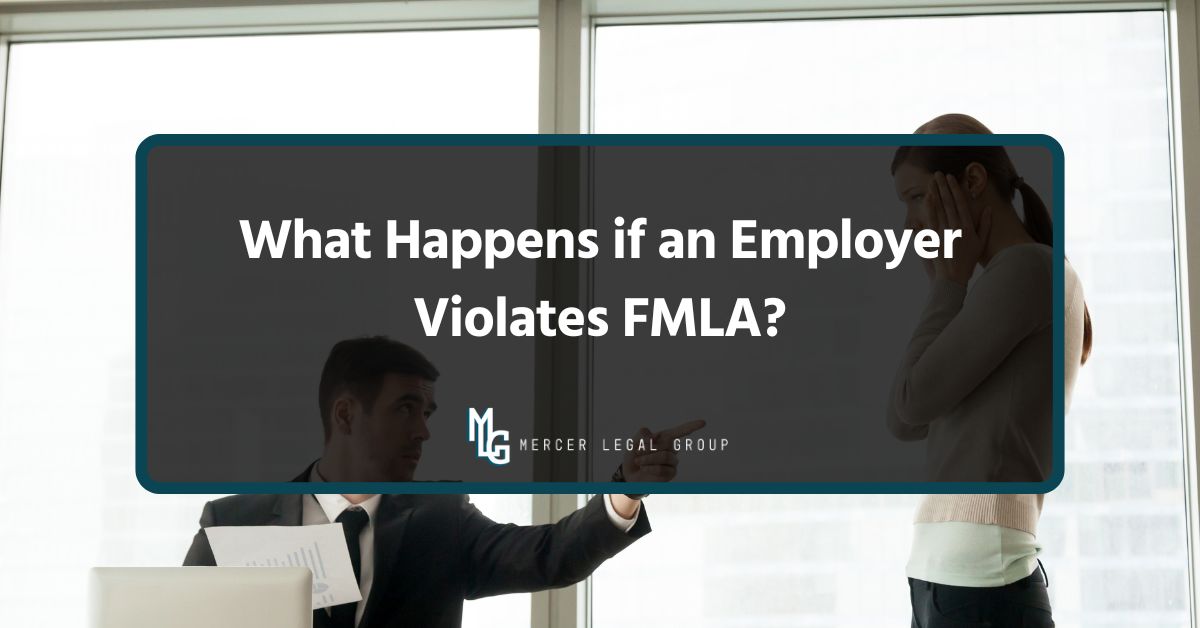The Family and Medical Leave Act (FMLA) gives eligible employees the right to take unpaid, job-protected leave for specific family or medical reasons without fear of losing their position. What happens if an employer violates the FMLA is that they may face legal action and be required to compensate the employee for lost wages, benefits, and other damages. In such cases, employees can file complaints or lawsuits to recover lost wages, benefits, and other damages.
At Mercer Legal Group, our experienced employment lawyers are dedicated to protecting employees whose FMLA rights have been violated. With years of proven success and a track record of favorable settlements and verdicts in FMLA and workplace retaliation cases, we bring deep legal knowledge and unwavering commitment to every client we represent. Our team understands how stressful it can be to face retaliation or job loss after taking protected leave, and we’re here to help you seek justice and compensation. Contact us today for a free consultation and let our trusted attorneys stand up for your rights!
This blog will explain the consequences employers face for violating FMLA rights and guide employees on how to protect themselves and pursue legal remedies.
What Is the Family and Medical Leave Act (FMLA)?

The Family and Medical Leave Act (FMLA) is a fundamental part of employment law. It’s designed to help employees juggle their work and family responsibilities without worrying about losing their jobs. It was passed in 1993 and lets eligible workers take unpaid, job-protected leave for certain medical and family reasons. The law’s main purpose is to ensure that workers can care for their health or family needs while maintaining job security and continued access to health benefits.
Under the FMLA, eligible employees are entitled to up to 12 weeks of unpaid leave within 12 months for qualifying reasons. These include the birth or adoption of a child, caring for a seriously ill family member, recovering from a serious health condition, or addressing urgent needs related to a family member’s military service. During this leave, employers must maintain the employee’s health insurance as if they were still working.
One of the key protections the FMLA provides is job restoration. When the employee returns from leave, they must be reinstated to the same or an equivalent position with the same pay, benefits, and working conditions. Employers are also prohibited from retaliating against employees who request or take FMLA leave. In some cases, legal proceedings may be initiated to compel compliance and ensure employers uphold these rights, reinforcing that the FMLA serves as both a shield and an accountability mechanism.
To qualify for FMLA leave, employees must have worked for their employer for at least 12 months and have logged at least 1,250 hours of service during the previous year. Additionally, the employer must have at least 50 employees within a 75-mile radius. While FMLA leave is unpaid under federal law, some states, such as California, offer partial wage replacement through state programs, which allow employees to receive a portion of their income during leave.
By understanding both federal and state protections, employees can fully utilize their FMLA rights. This knowledge is crucial for early identification of violations, taking the right action, and seeking legal help if an employer doesn’t respect your leave rights.
What Happens if an Employer Violates FMLA?
The Family and Medical Leave Act (FMLA) protects eligible employees by allowing them to take unpaid, job-protected leave for qualifying family or medical reasons without fear of losing their job or facing retaliation. A covered employer, including private employers with 50 or more employees and public agencies, regardless of size, must comply with FMLA obligations.
When an employer engages in prohibited conduct, such as denying leave, discouraging employees from taking it, or retaliating against them for exercising their rights, they can face serious legal and financial consequences. Both federal enforcement and private legal actions help ensure accountability and restore the employee’s rights.
If an employee believes their FMLA rights were breached, they can file a complaint with the U.S. Department of Labor (DOL). The DOL’s Wage and Hour Division investigates such complaints by reviewing documentation, interviewing witnesses, and assessing whether the employer complied with FMLA regulations. If a violation is found, the DOL can order corrective action or initiate legal proceedings on behalf of the employee to recover lost wages and benefits.
Alternatively, employees have the right to file a civil action directly against their employer. This option enables them to seek compensation in federal court for damages brought about by the violation, including lost income, benefits, and emotional distress, and, in certain egregious cases, punitive damages. Legal representation can enhance the case by collecting evidence and guaranteeing compliance with all procedural requirements.
When an FMLA violation is proven, courts may award several types of remedies. Employees can recover lost wages and compensation for unpaid time taken under protected leave, as well as liquidated damages, often doubling the total award if the violation was willful. Employers may also be ordered to pay the employee’s attorney’s fees and court costs. In some cases, the court can issue injunctive relief, such as reinstating the employee to their position or ordering the employer to stop retaliatory practices.
Common Ways Employers Violate FMLA

The Family and Medical Leave Act (FMLA) protects employees who need time off for serious health conditions, family care, or bonding with a new child, including those who require intermittent leave for ongoing medical needs. Unfortunately, some employers violate these rights, either through ignorance of the law or deliberate misconduct. Some examples of these violations include:
- Denying eligible employees FMLA leave: One of the most common violations occurs when employers wrongly deny leave to qualified employees. This can include claiming the employee does not qualify, questioning medical documentation, discouraging an employee’s request for leave, or misrepresenting eligibility based on employees’ work hours or tenure.
- Failing to notify employees of their FMLA rights: Employers are legally required to inform employees of their FMLA rights and eligibility. Failing to provide timely and accurate notice prevents employees from making informed decisions about their leave options and can also mislead a prospective employee about their future eligibility.
- Retaliation against an employee for taking FMLA leave: Retaliation after an employee exercises their FMLA rights is strictly prohibited. Such actions can form the basis of an FMLA retaliation lawsuit.
- Requiring employees to work while on leave: Employers cannot demand that staff members perform work duties, attend meetings, or frequently check in while on approved FMLA leave. Doing so undermines the purpose of the law, which is to allow employees unpaid, job-protected time off.
- Not restoring an employee to the same or equivalent position after leave: Upon returning from FMLA leave, employees must be reinstated to the same or a comparable position with identical pay, benefits, and working conditions. Failure to do so violates FMLA job protection provisions.
Recognizing these common FMLA violations helps employees protect their rights and take appropriate action when employers overstep legal boundaries. If you believe your FMLA rights have been taken away, consulting an experienced employment lawyer can help you pursue justice and compensation.
How to Prove an FMLA Violation
Proving an FMLA violation often depends on gathering enough information that shows your employer interfered with your right to take protected leave or retaliated against you for using it. Key evidence may include emails, HR records, performance reviews, time-off requests, or written denials of FMLA leave. These documents can demonstrate that you followed proper procedures and that your employer either ignored or wrongfully rejected your request to authorize FMLA leave.
The importance of documentation and communication with HR cannot be overstated. Keeping a detailed record of all interactions, including copies of correspondence and notes from meetings, helps establish a clear timeline of events. Written communication with HR also serves as proof that you complied with company policy and gave proper notice, which strengthens your credibility if your employer later disputes your claim.
In addition, timing and patterns of retaliation often reveal whether an employer violated FMLA protections. If negative actions like demotion, disciplinary warnings, or termination occur soon after requesting or returning from leave, it may signal retaliation. Identifying consistent patterns of unfair treatment before and after your leave can further support your case. Working with an expert FMLA lawyer and a reputable law firm can help you organize this evidence effectively and pursue the justice and settlement you deserve.
Steps to Take if You Suspect an FMLA Violation

If you suspect your employer has flouted your rights under the Family and Medical Leave Act (FMLA), it’s important to act quickly and strategically. Many violations stem from denial of leave, retaliation, or failure to restore an employee to their original position after returning from leave. Taking the right steps early can help protect your rights and strengthen any potential legal claim.
First, document everything related to your leave. Keep copies of your FMLA request forms, emails to HR, written responses from your employer, and any notes from conversations about your leave. Next, report the issue internally by notifying your HR department or manager in writing. Clearly outline your concerns and request clarification on your leave status. This process creates a record that you tried to resolve the matter through proper channels and ensures transparency.
If the issue remains unresolved, you can file a complaint with the U.S. Department of Labor’s Wage and Hour Division, which investigates FMLA violations and can take enforcement action against employers. For more serious issues, such as retaliation, demotion, or wrongful termination, contact an experienced employment lawyer. An attorney can evaluate your case, help gather evidence, and guide you through the legal process to protect your rights and pursue fair settlements.
How Do I File a Violation of FMLA Lawsuit?
Filing an FMLA violation lawsuit starts with collecting strong evidence to support your claim, such as FMLA request forms, medical certifications, emails with HR, and records of any retaliation. These documents help show that your employer denied your rights or took adverse action because you exercised them.
Before filing in court, you can submit a complaint to the U.S. Department of Labor’s Wage and Hour Division (WHD). The agency investigates FMLA violations and may help resolve your issue through mediation or enforcement. However, you may also file a private lawsuit in federal court without waiting for the DOL’s decision.
It’s best to work with an experienced employment lawyer who understands FMLA and retaliation cases. An attorney ensures your claim is filed correctly, deadlines are met, and all damages, such as back pay, lost benefits, or reinstatement, are pursued. Legal representation greatly improves your chances of protecting your rights and achieving a fair outcome.
What Are Employer Penalties for FMLA Violations?
Employers who violate the Family and Medical Leave Act (FMLA) can face serious financial penalties, including back pay for lost wages, front pay for future earnings, and liquidated damages that often double the total amount owed. These remedies are designed to compensate employees for financial losses caused by wrongful denial of leave, retaliation, or termination. In addition, employers may be required to cover the employee’s attorney’s fees and court costs, making FMLA violations an expensive mistake.
Beyond financial liability, there are significant legal and reputational consequences. Courts can issue orders requiring the employer to reinstate the affected employee, restore lost benefits, or change workplace policies to comply with the law. Repeated or publicized FMLA violations can also hurt an employer’s reputation, lower employee morale, and make regulators pay more attention to them.
It’s not just a legal requirement for employers to comply with the law and treat employees fairly; it’s also crucial for building trust and honesty in the workplace. By creating an open and respectful culture, employers can avoid legal issues, boost team spirit, and create a more efficient work environment.
How to Protect Your FMLA Rights
Protecting your FMLA rights begins with understanding your company’s leave policies and how they align with federal FMLA regulations. Review your employee handbook or speak with HR to confirm eligibility requirements, such as your length of employment and hours worked, as well as the proper procedures for requesting leave. Staying informed enables you to fulfill all required deadlines and steer clear of inadvertent mistakes that could potentially lead your employer to reject your leave request.
Another key step is submitting the required medical certification and documentation to support your FMLA claim. This includes having your healthcare provider complete the appropriate forms and providing updates if your condition or expected leave duration changes. Proper documentation strengthens your request and prevents disputes over whether your leave qualifies under the law.
It’s also essential to keep written proof of all FMLA-related communications, including emails, letters, and HR responses. These records can serve as vital evidence if your employer later denies your leave or retaliates against you for using it.
If you start to observe any indications of retaliation, such as unexpected changes in duties, disciplinary actions, or termination, you should promptly consult a legal professional. An FMLA discrimination lawyer can help you protect your rights, ensure compliance with FMLA requirements, and take swift action if your employer violates the law.
When to Contact an Employment Attorney

You should contact an FMLA employment attorney if your employer denied your FMLA leave even though you met all eligibility requirements or if they interfered with your right to take protected time off. Retaliation, such as demoting, disciplining, or terminating you after asking for or returning from leave, underscores the importance of legal assistance. These actions may indicate an FMLA violation, and an attorney can help determine whether your rights were unlawfully denied.
An experienced employment attorney can guide you through the complaint or lawsuit filing process, ensuring the proper presentation of all evidence and documentation. They can help you recover lost wages, benefits, and other damages, and they may also negotiate reinstatement to your former position. With skilled legal representation, you can protect your rights and hold your employer accountable for any wrongful actions under the FMLA.
Stand Up for Your FMLA Rights
The Family and Medical Leave Act (FMLA) provides crucial protections that allow employees to take job-protected leave for serious health conditions, family care, or bonding with a new child, without fear of retaliation or job loss. These rights ensure that workers can prioritize their health and family needs while maintaining financial and job stability. When employers ignore or violate these protections, it undermines both employee well-being and workplace fairness.
If your employer has denied your leave, retaliated against you, or failed to restore your position, legal remedies are available. You may be entitled to back pay, reinstatement, or compensatory damages for the harm you’ve suffered. Acting promptly is key. Document the violation, file a complaint, and contact an experienced employment lawyer to protect your rights. Don’t stay silent; stand up for your FMLA rights and ensure your employer is held accountable.
Have your FMLA rights been violated at work? At Mercer Legal Group, our experienced employment lawyers know how to hold employers accountable and secure the compensation you deserve. With a solid reputation in FMLA and workplace retaliation cases, we’re ready to protect your rights and restore fairness. Reach out to us today for a free consultation and take the first step toward justice.
FAQ
If an employer violates the Family and Medical Leave Act (FMLA), it can lead to serious legal and financial consequences. Understanding your rights and the possible remedies can help you take the right steps to protect yourself and hold your employer accountable.
Can You Sue Your Employer for Violating FMLA Rights?
Yes, you can sue your employer for violating your FMLA rights if they deny your qualified leave, retaliate against you, or terminate your employment unlawfully. Filing an FMLA lawsuit allows you to seek remedies such as lost wages, reinstatement, and other compensatory damages.
What Is the Penalty for Violating the FMLA?
Employers who violate the FMLA may be required to pay lost wages, benefits, interest, and other compensatory damages to affected employees. In some cases, they may also face reinstatement orders, liquidated damages, and attorneys’ fees.
What Is Considered FMLA Abuse?
FMLA abuse occurs when an employee misuses leave benefits, such as taking leave under false pretenses or engaging in activities inconsistent with their stated medical condition. Employers who suspect abuse may investigate and take disciplinary action if the misuse is confirmed.
What Is a Willful FMLA Violation?
A willful FMLA violation happens when an employer knowingly disregards or shows reckless indifference to an employee’s FMLA rights. Such violations can extend the statute of limitations for filing a lawsuit from two years to three years.
What Is the Average Settlement for the FMLA Lawsuit?
The average FMLA lawsuit settlement typically ranges from $10,000 to $50,000, depending on factors like lost wages, emotional distress, and the severity of the violation. Cases involving willful misconduct or retaliation can result in significantly higher compensation.
Is It Harder to Fire Someone on FMLA?
Yes, it is generally harder to fire someone on FMLA leave because employers must ensure the termination is unrelated to the leave itself. However, an employer can still lawfully terminate an employee on FMLA leave for legitimate reasons, such as poor performance of job duties or company layoffs, if properly documented.




